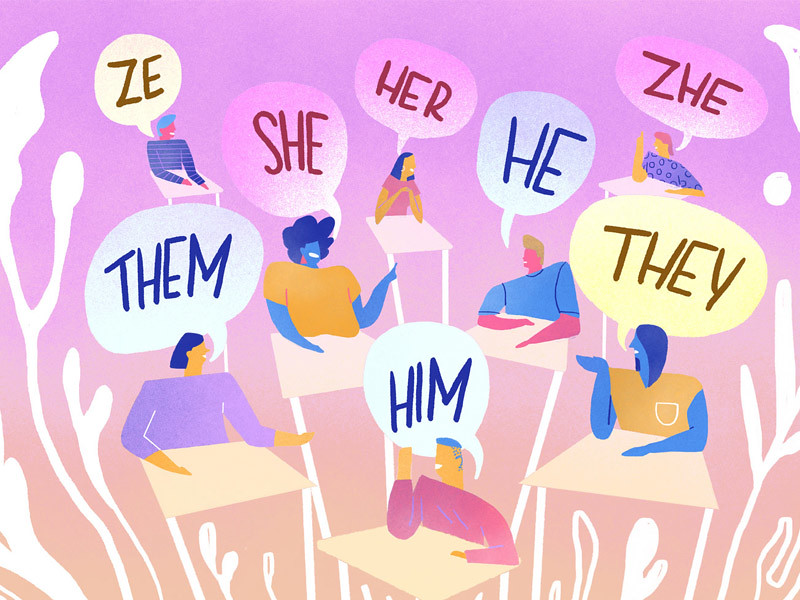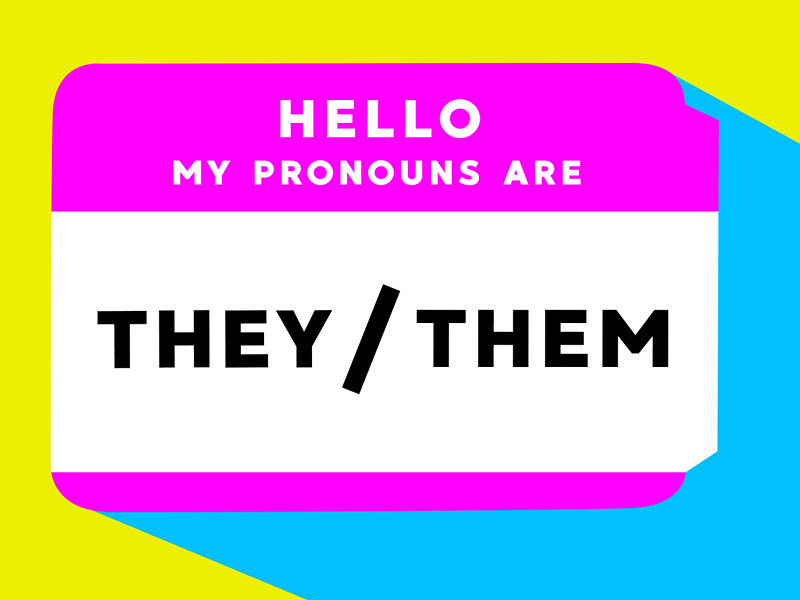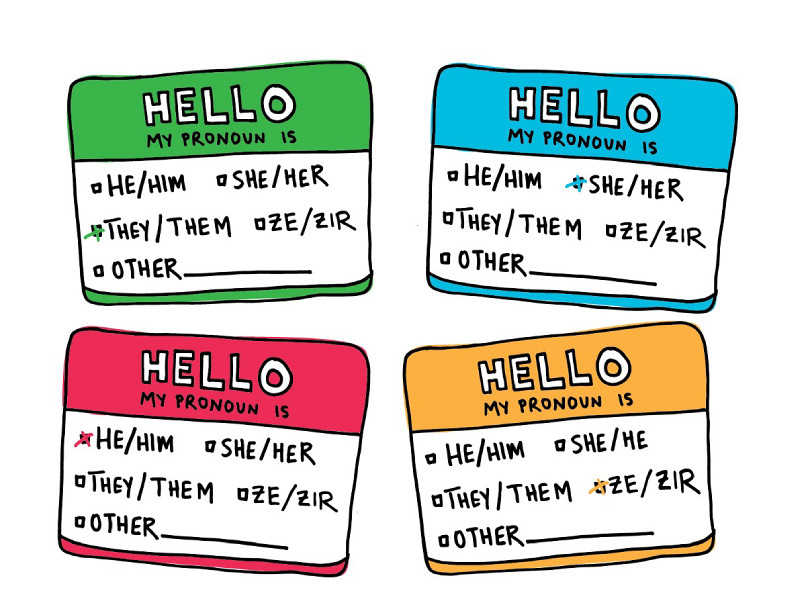|
By Alexandra Few The Merriam-Webster Dictionary defines a personal pronoun as: “a pronoun (such as I, you, or they) that expresses a distinction of person”. Personal pronouns are often used when identifying yourself or someone else. For example, someone who identifies as cis-gender, may use she/her pronouns or he/his pronouns. Within the 2SLGBTQ+ community, those that identify as trans, non-binary, or gender-fluid, may use pronouns that reflect how they identify. This can often include she/her or he/his, as well as they/them, ze/hir, or ze/zir. However, the pronouns that one uses, do not necessarily always indicate someone’s gender or how they identify, and thus gender-neutral terms can be universal. If you’re just being introduced to someone and are not sure of someone’s pronouns, you can always ask them what they are. However, instead of asking “what are your preferred pronouns”, which is often used, drop the preferred and instead ask, “what are your pronouns?”. Using preferred suggests the terms they use do not belong to them and are just preferred, rather than their “true” pronouns. They/Them Pronouns As society changes, vocabulary changes and the meaning behind words also change. The word “they” has had a plural meaning and has often referred to a group of people. While this can still remain true, “they” can also have a singular meaning and can refer to someone who may not identify with the pronouns she/her or he/him or prefers to use a mixture of pronouns. The singular “they” has actually been traced back to the year 1375 in medieval romance poem William and the Werewolf, where singular “they” referred to someone who was unnamed. However, in the eighteenth century, singular “they” was seen as an error and was only used as a plural pronoun. This has now changed and the majority of dictionaries, such as the Oxford Dictionary, and grammarians have accepted the singular use. However, it is apparent today that many individuals still reject the use of using “they” as a singular pronoun. Not only is this notion of refusing certain pronouns disrespectful, but it can be very harmful to those who do use various pronouns that do not coincide with the binary. The most common mistake that one can make is assuming, whether it’s about one’s gender, pronouns, etc. How someone chooses to present their outward appearance, their gender expression, does not always have to coincide with how they identify. Making an assumption based off of how someone looks sends a potentially harmful message, such as that someone has to look a certain way to be representative of their gender. What is even more harmful is when someone says their pronouns and it is disregarded and replaced with something else. Getting into what may seem like an “awkward” conversation, is actually not awkward at all, and this notion needs to change. For instance, if someone wants to be identified as “they” in a singular form but does not correct someone when they use “he” or “her” to identify them, it can be because they may not feel safe to do so. Having an open and inclusive conversation is something that society needs more of. Understanding that anyone, such as non-binary or genderqueer individuals can use they/them or even a mixture of he/him, she/her, and they/them, and that trans individuals can use pronouns that they identify with, whether their gender expression matches the societal expectations of that gender or not, is key to remaining inclusive of everyone. Why It Is Important? ©Seventeen | YouTube Pronouns are something society uses to identify and refer to each other with. When they are misused or disregarded, it can make it seem as though they are not important or there is only one way of identifying. Just as how you wouldn’t call someone by their nickname if they asked you not to, you shouldn’t use a pronoun that you find fitting when someone asks you to call them by something else. According to GLAAD, when you’re unsure of someone’s pronouns, listening to see what other people are using to identify that person as, is a key way to usually use the correct pronoun. Most of the time when someone knows them, they will use the correct pronouns. However, if this is not the case, often saying your own pronouns first can get the conversation going if that person didn’t already tell you their pronouns. For example, I would say, “Hi, I’m Alex and I use she/her/ pronouns, what about you?”. If the environment you are in is safe, introducing this into a conversation can be a way to have an inclusive and open dialogue. Mistakes happen though, as learning is constant. What happens if you do use the incorrect pronouns? According to GLAAD, quickly apologizing and moving on with using the correct pronoun from then on is the best course of action. The more you apologize and make it a huge deal, the more uncomfortable the situation will become. Trans, non-binary, or genderqueer individuals are often misgendered daily. Whether you identify within the 2SLGBTQ+ community, or you are an ally, showing effort and educating yourself and others on topics such as pronoun use, demonstrates your willingness to be accepting and inclusive. For change to happen, actual change has to happen. If someone identifies using a pronoun that you may not be familiar with, don’t challenge it or choose to use something else. Be open, respectful and use those pronouns, as that is what everyone is deserving of. *Alexandra Few is a recent Psychology and Communications Studies grad from York University. Alexandra's passion resides in fighting stigma and injustice through education and awareness and is a strong supporter of open conversations that lead to visibility, inclusion, and positive change. Editor’s Note: The opinions expressed by the guest writer and those providing comments (if any) are theirs alone, and do not necessarily reflect the opinions of VX3 Exchange Inc. or any employee thereof. VX3 Exchange Inc. is not responsible for accuracy of any of the information supplied by the guest writer. It is not the intention of VX3 Exchange Inc. to malign any community, religion, ethnic group, club, organization, company or individual. |
Recent Posts
Categories
All
Archives
February 2022
|
|
GET THE APP!
Listen to VIBE 105 anywhere you go!
|
OUR STATION
|
TUNE IN RADIO
|
STAY CONNECTED
|
Copyright © 2021 Canadian Centre for Civic Media and Arts Development Inc. Except where otherwise noted, presentation of content on this site is protected by copyright law and redistribution without consent or written permission of the sponsor is strictly prohibited.





 RSS Feed
RSS Feed


